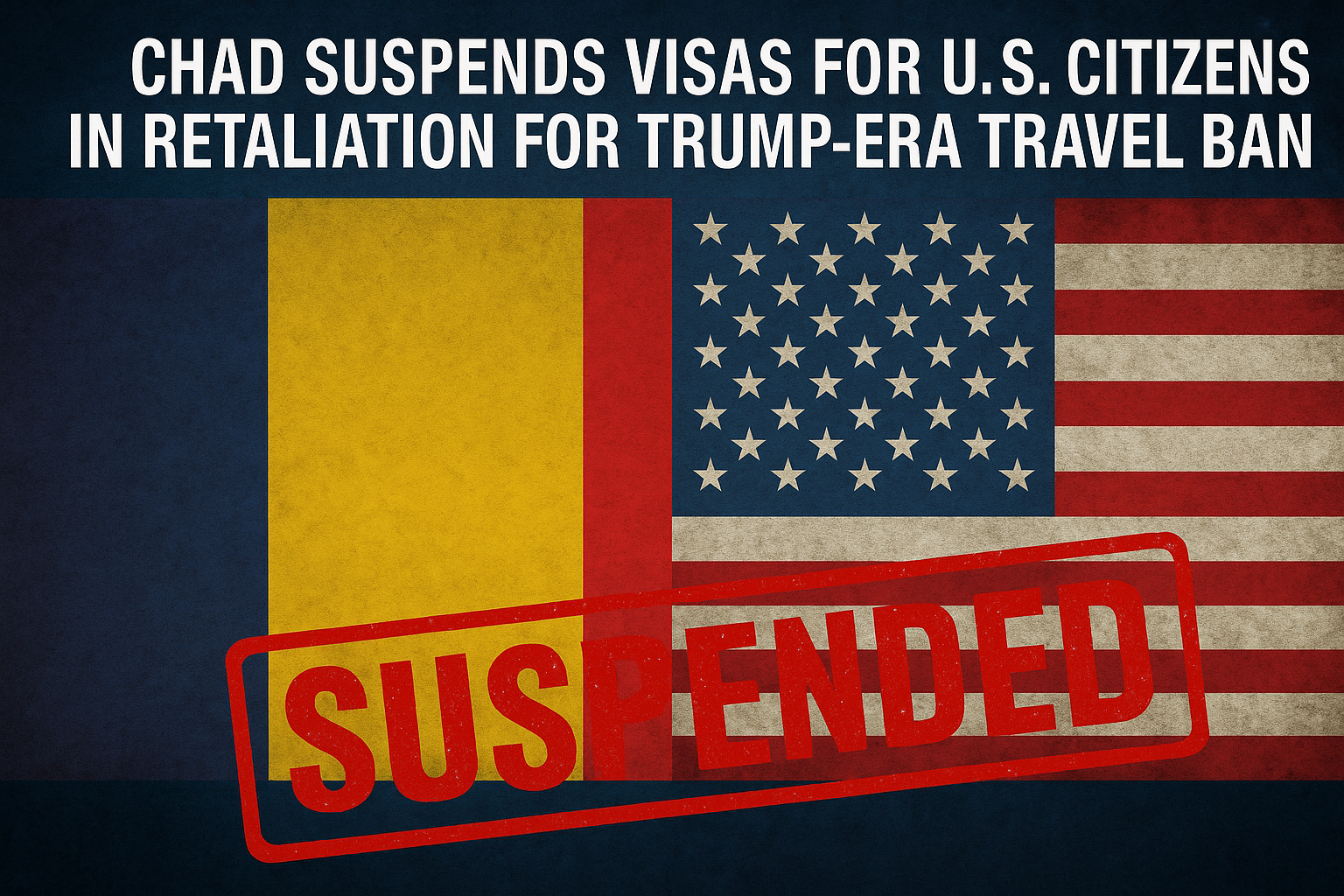In a bold move that is sending ripples through the global diplomatic community, Chad suspends visas for U.S. citizens, citing the need for reciprocity and dignity in foreign relations. The Chadian government announced on June 6, 2025, that all categories of U.S. visa applications—tourist, business, diplomatic—would be halted with immediate effect.
Thank you for reading this post, don't forget to subscribe!The decision is widely regarded as a retaliatory response to the controversial Trump-era travel ban, which once targeted several African and Muslim-majority nations, including Chad. Although President Joe Biden lifted the ban in 2021, resentment has simmered quietly within African nations that felt unfairly profiled.
“This is not about vengeance,” said Chad’s Foreign Affairs Minister. “It’s about principle and parity. When we were treated unjustly, no one listened. Today, we are responding with dignity.”
A Flashback to the Travel Ban
The Trump travel ban, formally known as Executive Order 13769, was introduced in 2017 and expanded in 2020. Chad was briefly included on the list before being removed after lobbying efforts. However, that short-lived designation deeply impacted Chad’s international image and its citizens’ mobility.
The Chadian government has long held the belief that the U.S. acted unfairly, even while Chad remained a loyal security partner in counterterrorism operations across the Sahel.
Why Now?
Chad’s decision to suspend visas for U.S. citizens comes amid a broader push by African nations to assert more control and equality in their international relationships. According to government sources in N’Djamena, the timing is deliberate.
- The U.S. is currently seeking to renew counterterrorism cooperation in the region.
- Chad is trying to rebuild its global image post-transitional government.
- The geopolitical landscape has shifted, with China and Russia making inroads into African diplomacy and infrastructure.
Chad’s suspension is seen as a calculated move to demand respect and leverage geopolitical influence.
The Global Response
So far, the U.S. State Department has not issued an official response, though diplomatic backchannels have reportedly been activated. Humanitarian organizations operating in Chad have expressed concern about possible disruptions to aid delivery, given the many American staff working in the country.
African political observers have been quick to applaud Chad’s move.
“This is not isolationism. This is sovereignty,” commented Dr. Salim Issa, a West African political analyst. “Chad is showing that it will not be bullied or ignored.”
Implications for the U.S.
This suspension comes at an inconvenient time for the U.S., which has been working to rebuild relations with African countries after years of perceived neglect.
Potential Consequences:
- Disruption of U.S.-backed counterterrorism operations.
- Halted progress in bilateral trade discussions.
- Weakened American influence in Central Africa, especially with growing Russian and Chinese presence.
American academics, aid workers, and tourists may now be barred from entering Chad unless a new agreement is reached.
What This Means for Africa
Many African countries have long called for reciprocity in visa policies. Western nations often implement strict visa requirements for Africans while enjoying easier access in return. Chad’s move could inspire similar actions from countries such as:
- Nigeria
- Ethiopia
- Democratic Republic of Congo
- Eritrea
This policy shift may ignite a larger continental conversation about African dignity in diplomacy.
Internal & Outbound Resources
Related Read:
👉 Africa Rising: New Players, New Power
External Resources:
👉 Executive Order 13769 – Federal Register
👉 U.S. Travel Policy Under Biden
Final Thoughts
As Chad suspends visas for U.S. citizens, it sends a clear message: African nations are no longer passive recipients of foreign policy—they are active, assertive players in global politics. While this may lead to temporary diplomatic discomfort, it could ultimately pave the way for more equitable and respectful partnerships.
This development will likely be a litmus test for how the U.S. handles rising assertiveness from African nations—especially those with growing strategic value.


